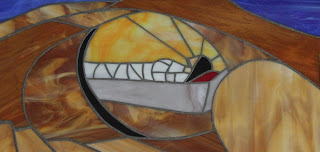The topic of the conference was "How can we start again? Centurial Vision for Post-disaster Japan. Two American theologians and three Japanese theologians presented their essays on the relationship between disaster relief and evangelism throughout Church History and how each of the major disasters in history helped shape or change the identity and or mission of the Church and how the Church engaged with society in those times. It was a very fascinating topic to hear, especially just a week after hosting an international forum in Fukushima. It was also interesting to me personally because the broad-mindedness of the ideas expressed in these essays answered many of my questions about how to interpret the socio-political level of meaning of disaster in a culture where people understand clashes of worldviews and supernatural dimensions of human politics (read my very first blog on this issue here and also on Yasukuni shrine here).
What caught my attention most was the final presenter, Hideo Ohki who presented an essay called "The Reformation Pressed upon Us by God," with a subtitle of "Thinking Japan theologically," or Theologize Japan, do not Japanize Christianity as he explained in his presentation. He gave an example with his interpretation of the socio-political impact of the Kanto earthquake that took place in Tokyo, and killed over 100,000 people in 1923. The Kanto earthquake is the second largest natural disaster in Japanese history (the largest disaster being this Tohoku disaster).
In the period leading right up to that earthquake, Japan had been victorious in wars with China and Russia. Fought on the side of the English, French and American Allies in the World War I, and enjoyed the prosperity of Taisho Liberalism. However, the Anglo-Japanese Alliance that had supported newly developing Japan was decided against in 1921, and officially terminated on August 17, 1923 (Taisho 12). Just fifteen days later, the Great Kanto Earthquake destroyed Tokyo, turning it into a scene of disaster and misery. ....
In 1933, ten years after Tokyo was dstoryed, Japan left the League of Nations and its seat as a permanent member and joined Germany, where Hitler had come to power, to form the Axis powers, thus cutting off the rudder of destiny and moving on its disastrous course towards August 15, 1945....
In the very year of 1933, with his "Theological Existence Today" Barth stood against "German Christians" who were connected to Hitler. However, a bizarre phenomenon took place. "As if nothing had happened,"using Barth's expression, Japanese churches on Sunday kept theri worship services with the vertical relationship (with God) in a spiritual catacomb, so to speak. And they could not help but obey the national policy during the weekdays in militarist Japan. The dualism resulted from misusing the "transcendence" of Barthian theology.
.... I cannot help but feel that God is pressing us to reform the post-war Protestant churches in Japan through the great earthquake that also shook us from the foundation.
"The Reformation Pressed Upon Us by God: Thinking Theologically of Japan"
Three lies of Satan, the roadblock to transformation of Japan
Dr. Eisuke Kanda, the leader of Friends with the Voiceless International (FVI), has been consistently calling the Japanese churches to a paradigm shift from insularity to active service in their local communities. The triple-disaster in Fukushima that shook foundations of modern Japanese culture and mindset is now waiting for a paradigm shift (listen to him on why FVI chose to work in Fukushima in my interview with him last July - here). After another six months passed, I asked him a question, "What is one thing you've learned through this disaster?" his answers were short and clear.
Repent for the Kingdom of God is near. We Japanese Christians need to repent in the ways we lived under the lies of Satan. The three major lies are:
First, Ba'al (or mammon) worship: Money will make you happy!
Second, Babel tower: science and technology will make you happy!
Third, oppressive power structures: The leaders will decide. I don't need to think!
This message isn't just for Japanese Christians only, and it applies to all of us. It's time to theologize every nation and stop (Koreanizing or Canadianizing) Christianity. This is not an easy task. The foundations of modern confidence in money, science and technology, power and control have now shaken, but we have a story to begin again. And that is God's story of transformation and his love story to his creation through the cross and that is the good news which has the cosmic scope and impact:
The Son is the image of the invisible God, the firstborn over all creation. For in him all things were created: things in heaven and on earth, visible and invisible, whether thrones or powers or rulers or authorities; all things have been created through him and for him. He is before all things, and in him all things hold together. And he is the head of the body, the church; he is the beginning and the firstborn from among the dead, so that in everything he might have the supremacy. For God was pleased to have all his fullness dwell in him, and through him to reconcile to himself all things, whether things on earth or things in heaven, by making peace through his blood, shed on the cross.(Colossians 1:15-20)
This is not about simply saving individual souls and vanishing up in the sky. The risen King is on his way to be with his bride and the earth will receive her King again! There will be no more pain, no more suffering (Rev 19-21). That is the Easter hope.






